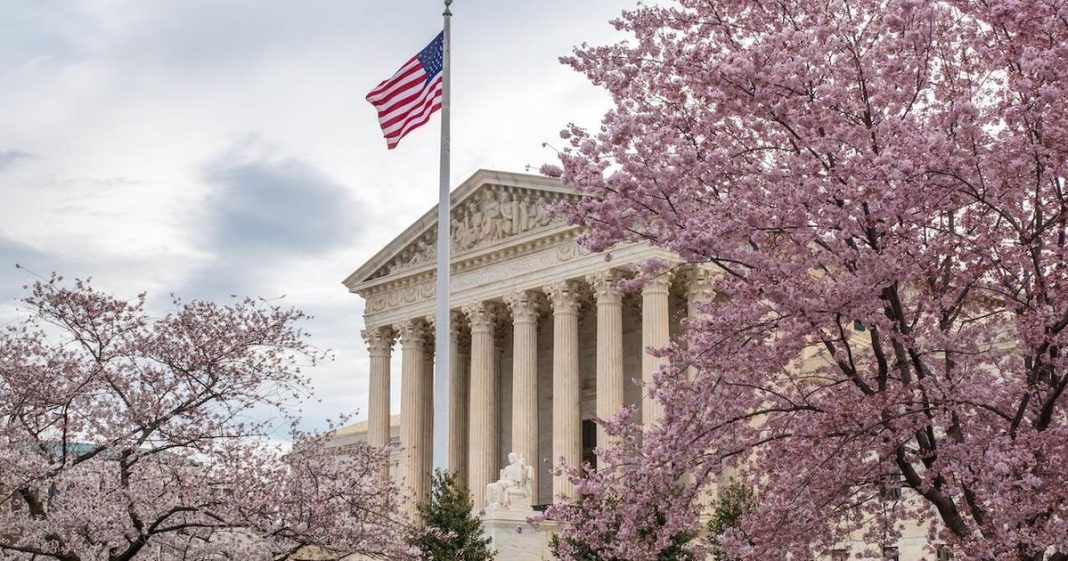Washington — An evenly divided Supreme Court on Thursday upheld a lower court decision that invalidated a contract approved by the Oklahoma Statewide Charter School Board that established the nation’s first religious charter school, blocking the effort in a closely watched case that posed a test for the separation of church and state.
The high court split 4-4, which leaves in place the decision of the Oklahoma Supreme Court. Justice Amy Coney Barrett did not participate in the case. The high court issued a one line, unsigned decision stating “the judgment is affirmed by an equally divided court.”
Argued at the end of April, the legal fight could have opened the door to public dollars flowing directly to religious schools. But following the arguments, it appeared that the outcome of the case would hinge on Chief Justice John Roberts, who focused on the level of state involvement in its charter school program. The issue of whether religious institutions must be permitted to participate in state charter school systems is likely to land before the Supreme Court again in a case likely to involve all nine justices.
The legal battle over the attempt to create St. Isidore of Seville Catholic Virtual School in Oklahoma came on the heels of a trio of recent rulings in which the Supreme Court sided with religious families and institutions challenging state-funded programs for excluding religious beneficiaries as violating the First Amendment’s Free Exercise Clause.
In 2017, the high court ruled that Missouri violated the free exercise right of Trinity Lutheran Church Child Learning Center when it denied it grant funding to resurface its playground. Then, in 2020, the Supreme Court said that Montana could not exclude religious schools from a program providing tax credits to people who donate to scholarships for private-school students. Most recently, in 2022, the Supreme Court said Maine cannot limit a tuition assistance program to nonsectarian schools.
A decision in favor of the school, St. Isidore of Seville Catholic Virtual School, could have led to the country’s first religious charter school. Oklahoma Attorney General Gentner Drummond, a Republican who argued against establishment of the school, had warned that a decision allowing its contract to stand would upend laws in at least 45 states and the District of Columbia, as well as the federal charter school program, all of which require charter schools to be nonsectarian.
Oklahoma has offered charter schools within its public education system since 1999 and, like at least 44 other states and the federal charter school program, requires the institutions to be “nonsectarian in its programs, admission policies, employment practices, and all other operations.” The state has at least 30 charter schools that serve more than 50,000 students, and they received $314 million from the state and $69 million in federal funds in the 2022 to 2023 school year, according to a 2023 report from the Oklahoma State Department of Education.
In January 2023, the Archdiocese of Oklahoma City and the Diocese of Tulsa formed the St. Isidore of Seville Virtual Charter School Inc. for the purpose of establishing and operating St. Isidore as a Catholic school, according to court records. That May, St. Isidore applied to the Oklahoma Statewide Charter School Board to establish it as a virtual charter school that “fully embraces the teachings of the Catholic Church’s Magisterium” and “fully incorporates these [teachings] into every aspect of the school.”
The school estimated initial enrollment of 500 students and projected it would receive roughly $2.7 million in state funding for its first year of operation, according to court documents.
Ahead of a vote by the board, Drummond warned against approval of St. Isidore’s application, and said an earlier analysis from his predecessor supporting the school could be “used as a basis for taxpayer-funded religious schools, which is exactly what [St. Isidore] seeks to become.”
Still, the charter school board voted 3-2 to approve St. Isidore’s application, and in October 2023, it and the school entered in a contract establishing St. Isidore’s as a charter school.
That month, Drummond sued the board directly in the Oklahoma Supreme Court and asked it to rescind the charter contract and declare St. Isidore’s establishment as a charter school unlawful.
The attorney general prevailed before the state’s highest court, which ruled that because St. Isidore’s is a public charter school, it violated the state’s requirement that those entities be nonreligious, as well as the Establishment Clause of the First Amendment, in part because it would “permit state spending in direct support of the religious curriculum and activities within St. Isidore.”
Oklahoma’s charter school board and St. Isidore’s appealed the state court ruling to the Supreme Court, and it said in January it would review that decision.




